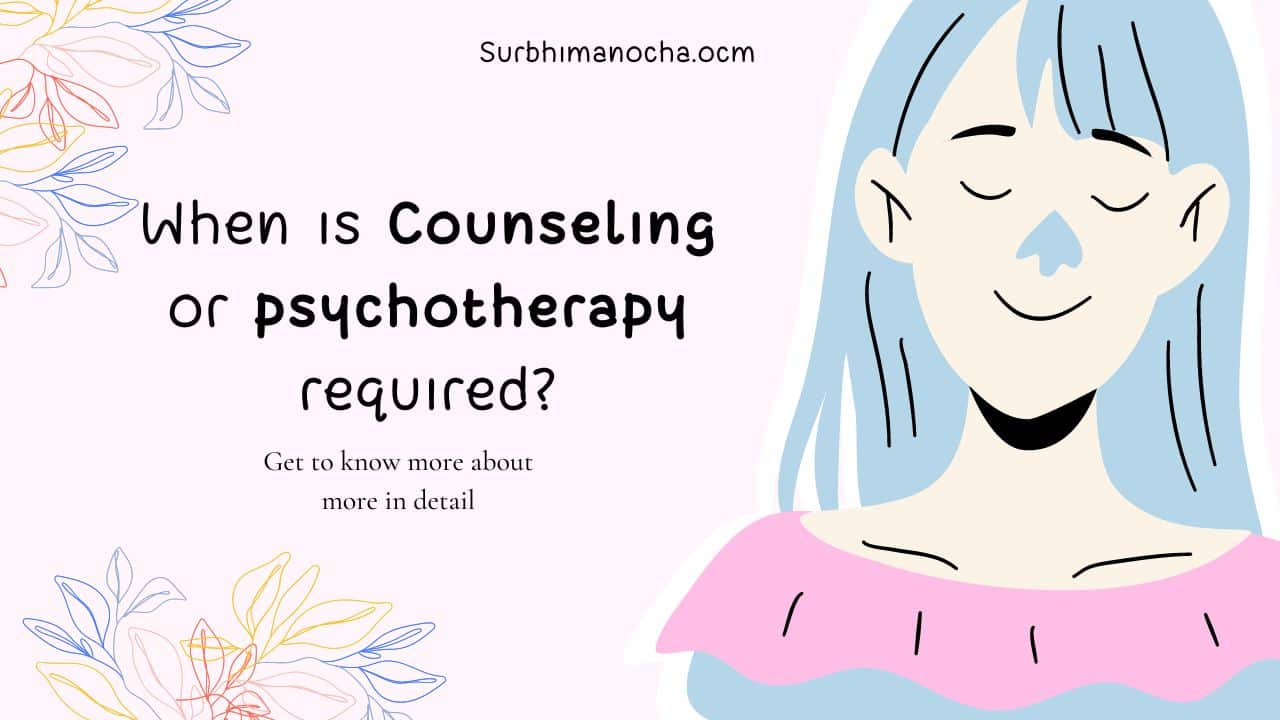Home » When is Counseling or psychotherapy required?
When is Counseling or psychotherapy required?

Life isn’t always smooth sailing. There are moments when it feels like our emotions are stacking up like a towering pile of laundry that never seems to end. You’ve probably heard your fair share of advice from friends, but when those familiar words just don’t seem to trim it anymore, it might be time to consider a game-changer – Counseling. In this blog, we’ll dive into some everyday challenges that could be your signal to seek professional support.
Lack of Confidence
Do you remember a time when you faced the world with unshakeable confidence? You were the life of the party, always up for new challenges. But lately, you’ve found yourself hesitating, shying away from opportunities, and battling self-doubt. Whether this lack of confidence stems from early shyness or has developed over time, it can be a heavy burden to carry. It might impact your decision-making, limit your personal growth, and hinder your pursuit of happiness. If you can relate, know that seeking a counselor can be the first step to rediscovering your inner strength and rebuilding your self-assurance.
Lack of Interest in the Things You Love
Do you recall the days when your favorite activities brought immense joy? Recently, you might have noticed a wane in your enthusiasm, feeling disengaged from the things you once loved. This sense of disinterest can be discouraging and lead to hopelessness, affecting your overall well-being and sense of fulfillment. It’s essential to explore these emotions to reignite the passion you once had for the activities you cherish. The reasons can be numerous but a therapist can delve into the root causes of this disinterest and provide guidance to reignite your passion, helping you overcome any obstacles in your way.
Procrastination
Are you constantly postponing important tasks, trapped in a frustrating cycle of delay and avoidance? Procrastination can be a significant roadblock to your personal and professional development. It often leads to missed opportunities, decreased productivity and increased stress. Counseling can help you delve into the reasons behind your procrastination and provide you with effective strategies for overcoming it. You’ll gain valuable organizational skills and motivational techniques to break free from procrastination and achieve your goals.
Facing Major Life Changes
Major life changes, whether it’s a new job, moving to a different place, a breakup, marriage, or becoming a parent, can be incredibly challenging. These transitions often bring a whirlwind of emotions, uncertainty, and adjustments. During these times, having a counselor by your side provides a safe space to process the whirlwind of emotions and develop practical coping mechanisms to navigate the new chapter in your life.
Behavioral Changes
Have you ever found yourself suddenly overwhelmed by mood swings, struggling with anger, or withdrawing from your friends and loved ones?These behavioral changes can be distressing, but understanding their underlying causes is the first step towards positive transformation. If these behavioral changes are interfering with your well-being, it might be time to consider counseling. A therapist can help you uncover the underlying causes of these changes and equip you with the skills to communicate better, express your emotions healthily, and rebuild the relationships that may have been strained.
Feeling Constantly Overwhelmed
Do you find yourself drowning in tasks, struggling to find time and energy to tackle your to-do list? It’s not uncommon to experience this sense of being buried under the weight of responsibilities, leaving you permanently drained. Whether it’s the demands of work, family, or personal goals, the constant juggling act can lead to a state of overwhelm. This constant feeling can take a toll on your mental and emotional well-being, making it challenging to find the balance you seek in your life. If this constant feeling of being overwhelmed is a familiar struggle, counseling can provide practical solutions. Whether it’s setting boundaries, mastering goal-setting, organizing your to-do lists, managing your schedule, or simply practicing self-care, a therapist can guide you towards a more balanced and stress-free life.
It’s not always easy to spot when life’s everyday challenges have escalated to a point where you need extra support. Keep an eye out for shifts in your mood, interests, how you connect with others, and your ability to handle stress. Engaging in conversations with trusted friends and family can provide valuable external perspectives. And remember, you don’t always have to wait to seek help until you’re in crisis.
Expand Your Horizons:
Browse Our Other Informative Reads
Get Started Booking Your Appointment is
Just a Click Away
-
Select Location
-
Select booking
-
Select Service
-
Select Date & Time
-
Enter Information
-
Payment Method
-
Verify Order Details
-
Confirmation
